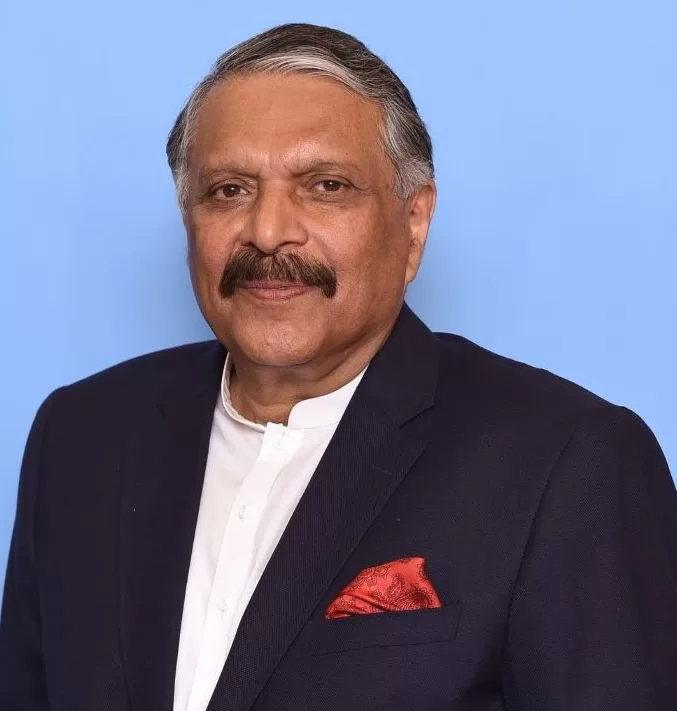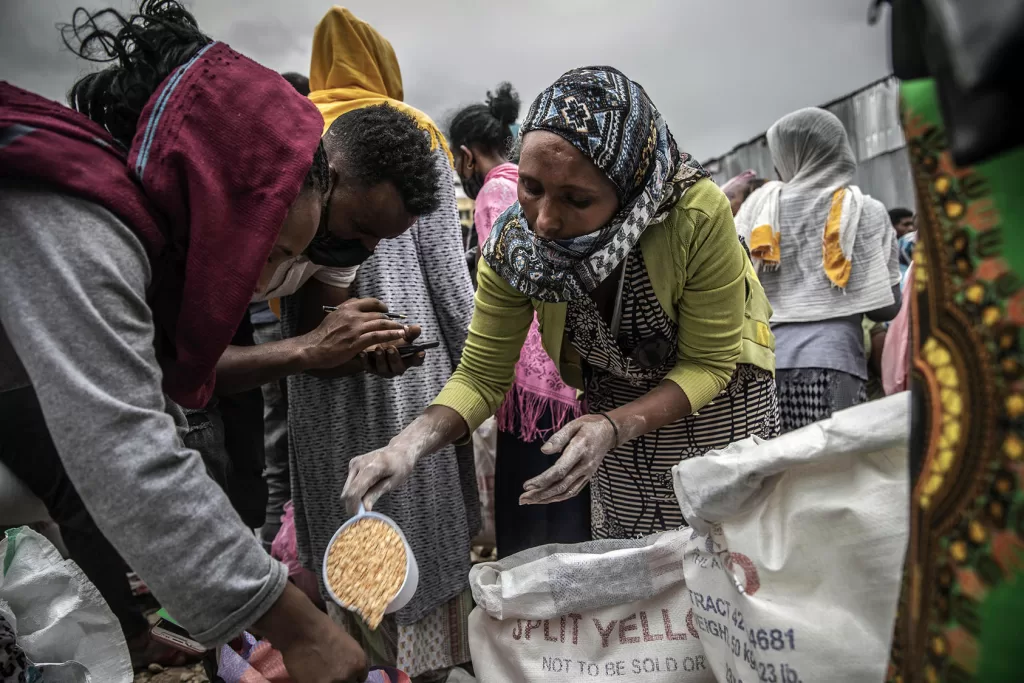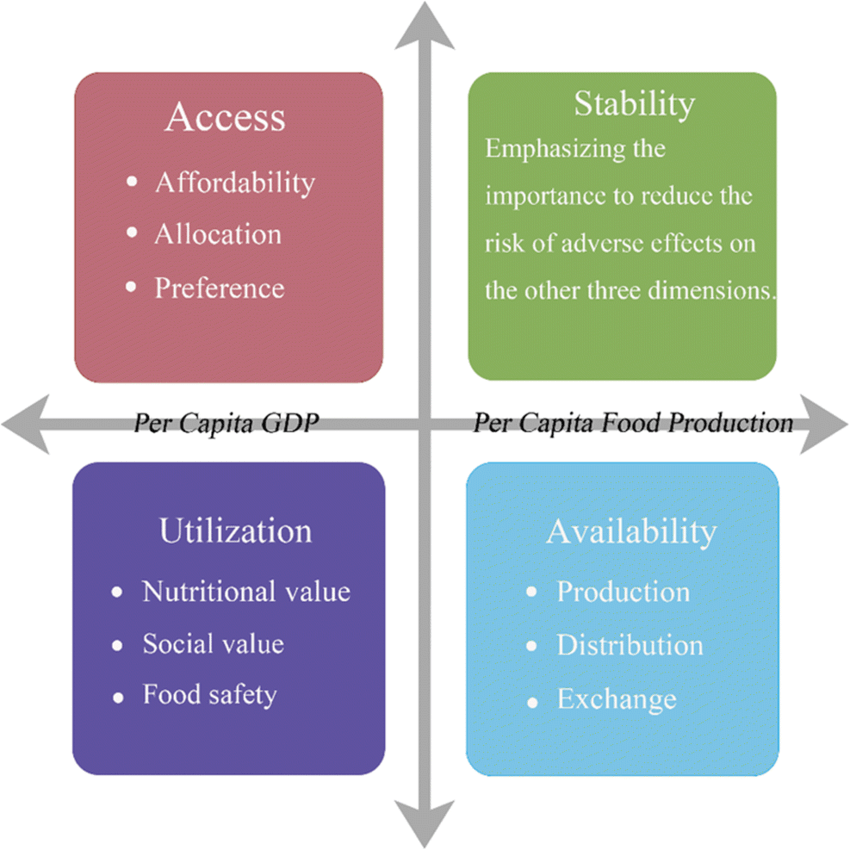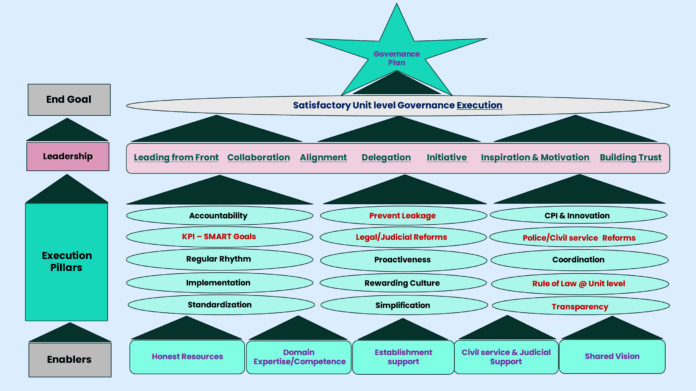A country without an effective governance mechanism cannot progress, compete and grow in the comity of nations. Pakistan, unfortunately is the victim of bad governance since its creation.
In the context of Governance and Pakistan’s national interests, three points are being elaborated below to demonstrate the criticality and relation between governance and the national interest of Pakistan.
Good Governance: A Universal Imperative:
Whether in developed or underdeveloped nations, the principles of good governance, including the rule of law, are crucial for sustainable growth and societal well-being.
The Heartbeat of Prosperity:
Good governance fosters a culture of reform, accountability, and proactive decision-making, serving as the bedrock for a prosperous nation and a robust democracy.
Pakistan’s Path to Progress:
By prioritizing honest leadership, accountability, and effective governance structures, Pakistan can unlock its true potential and pave the way for a brighter future. In a world marked by diverse political landscapes and varying levels of economic development, one aspect remains constant: the significance of good governance in determining a nation’s prosperity. Regardless of whether a country, including Pakistan, is considered developed or underdeveloped, the principles of good governance are indispensable for sustainable growth and well-being. Among these principles, the rule of law stands out as paramount.

Good governance is akin to the beating heart of a prosperous nation. It fosters a culture of reform, efficient implementation, proactive decision-making, just rewards for virtuous behavior, a consistent rhythm of progress, and unwavering accountability. In countries where the model of good governance thrives, its impact on economic and social development is undeniable. It not only cultivates healthy and vocal societies but also strengthens the foundations of democracy.
Embracing the timeless adage that “Honesty is the best policy,” our primary objective is to establish an actionable governance model tailored to meet the needs of the people of Pakistan. This model aims to ensure effective governance at every level of government, from the grassroots to the highest echelons. Its applicability extends to all government institutions, their functions, and relevant stakeholders, encompassing units ranging from tehsils and districts to divisions, provinces, and the entire nation.
Within this governance model, four distinct levels— Union Council/Town Committee, District Council/Metropolitan Corporation, Provincial, and Federal—form the framework for efficient governance. Irrespective of a country’s governance structure, it invariably operates on two key models: governance and deliverance. While the deliverance model obliges the government to provide citizens with basic necessities and guarantee constitutional rights, the governance model is indispensable to ensure the seamless delivery of these fundamental needs to every citizen’s doorstep.
The structure of provincial and federal governments is meticulously defined in the Constitution, but the same cannot be said for the union and district councils. This oversight urgently demands rectification. Without an efficient Local Government structure, the constitutional guarantees of basic necessities remain elusive for citizens.
The core of our governance model is depicted in Figure 1, comprising three essential domains: Leadership, Execution Pillars, and Enablers. Leadership characteristics vital to this model include leading from the front, inspiring and motivating, taking initiative, fostering collaboration, promoting alignment, and building trust.
Within the Execution Pillars, key functions include the presence of honest individuals with domain expertise, inspirational and motivational leadership that leads by example, unwavering commitment, inclusivity, a clear and shared vision, units and organizations guided by Key Performance Indicators (KPIs) and SMART goals, staunch measures to prevent system leaks (such as smuggling, power theft, and tax evasion), and the introduction of a reform-oriented culture across all vital functions, including Law & Justice, Civil Service, Police, and Correctional System.
In the Enabler domain, the cornerstone elements are honest individuals with subject expertise, government support, and a shared vision that unites all stakeholders. Good governance is not a luxury but a necessity for any nation striving for prosperity, whether developed or underdeveloped. It is the linchpin that ensures the efficient delivery of basic necessities and Constitutional rights to every citizen. To achieve this, we must prioritize the establishment of a robust governance model, addressing gaps in local government structures, and fostering a culture of honesty, accountability, and reform at every level of governance. Only then can we unlock the true potential of our nation and pave the way for a brighter future. The concept of good governance not only addresses the regulatory issues but also helps addressing the fundamental issue of basic necessities like food security and availability which is very much tied up with population and urban spread.

Food Security & Urban Spread
The topic of Food Security topic was not in the limelight as it should have been, however, observing recent global events and rising concerns on supply chain issues and lack of food security worldwide, it is now fundamental to put enough focus on this potential danger that can impact vast populations of the world, specifically low income and poor countries. A lot of seminars/webinars and scholastic discussions are ongoing on food security and experts are trying to find ways how to protect the near future shortage of food supplies that is fundamental for the existence of the mankind.
The Ukraine War is deepening global food insecurity. Even before Russia invaded Ukraine, the global economy was suffering from the repercussions of several man-made conflicts, climate shocks and natural disasters, COVID-19 impact and rising food costs. Ukraine, which is seen as a major “breadbasket” for the world due to its vast supply chain to the world, but the war with Russia is deepening food security challenges on an unprecedented scale. As the war drags on, record levels of acute food insecurity are expected to rise exponentially. The latest food insecurity crisis spreading around the world is not happening in a vacuum. Amid the COVID pandemic, supply chain issues and soaring inflation, global food prices have been on the rise since mid-2020 and are now at an all-time high. Global food markets are extremely concentrated, both in terms of supplies and reserves. Such concentrated and thin markets mean that when crises like the war in Ukraine happen, the global supply of food can be derailed quickly, leading to high costs.
For example, insurance premiums are skyrocketing for vessels operating in the Black Sea, which only further raises prices of staple foods. Many countries are turning to alternative sources but there are cost increases associated with these manoeuvres as well. Countries in Europe and the Middle East that relied on Russian or Ukrainian food imports now suddenly have to pivot acquiring them from Canada or Australia, but these will be more expensive given the greater distance travelled. Shocks like the war in Ukraine put into stark relief that food insecurity challenges are not always related to availability issues. Rather, it’s a question of accessibility and affordability.
At the UN and international academia level, there are many programs and studies about handling food security challenges. These studies mainly focus on Increasing yields, profitability, and environmental sustainability, developing the varieties and breeds needed for sustainable food systems, decreasing food loss and waste through more efficient distribution systems, creating and sharing resources that serve all populations.
The aim is to ensure inclusive and equitable food systems and finally ensuring a safe and secure food supply that protects and improves the vast global population health. The aforementioned elaborated upon the background for the sake of reader’s awareness, now let us focus on the kind of impact on Pakistan and the region in regard to challenges related to food security. While the challenges for Pakistan are there, one of the biggest for Pakistan is to manage the huge influx towards urbanization and diminishing agriculture lands.
5 Expanding Urban Population & Consequences
This is the global phenomenon especially in the developing countries and is getting worse due to the simple reason that people are migrating from rural areas to established cities and urban lands looking for more opportunities whether in education, jobs or business. The equation is simple, the more people there are, especially in poor countries with limited amounts of land and water, the fewer resources there are to meet basic needs.
Amongst the negative consequences of rapid urbanization, there has been a shift in production patterns of food, highly correlated with access to processed foods that is utterly unhealthy. The other unpleasant consequence of rapid urban growth is the spread of infectious diseases. Consequently, death rates in urban areas historically were higher than in rural areas. The problems associated with urbanization are, high population density, inadequate infrastructure, lack of affordable housing, flooding, pollution, creation of slums, crime, congestion, and poverty. Some of the major health problems resulting from urbanization include poor nutrition, pollution-related health conditions, communicable diseases, poor sanitation housing conditions, and general related health conditions. If we see Pakistan specifically, we can see that major cities like Karachi, Lahore, Islamabad, Rawalpindi, Faisalabad and Multan have grown up massively in terms of rural to urban migration. As a direct consequence of this migration, the people who were associated with agriculture profession tend to sell their lands and buy real estate land for residential and business reasons in the major cities. The farming land they had sold, now turning out to be real estate projects, result in diminishing farming lands that are badly impacting our national food security.
Pakistan was a food rich country a decade ago, but very unfortunately since the real Estate mafia sprang into action buying agriculture lands in order to develop further residential real estate societies, Pakistan is forced to import basic food necessities and this is creating a huge burden on foreign exchange, economy and is also negatively contributing to the national GDP. Catastrophic floods in Pakistan have pushed the country almost to the brink; these floods followed the COVID-19 pandemic, causing rising inflation and the most severe heatwave the country has faced in more than 60 years.
Due to these factors, Pakistan which was once a food surplus country, is now ranked 92nd out of 116 countries on the 2021 Global Hunger Index and according to the International Food Security Assessment by the US Department of Agriculture, in the coming decade a total of 38 percent of the population of Pakistan is going to face food insecurity.
One of the major problems is pollution that is primarily caused by over growth of a city and it has been recently seen in Pakistan, this is the direct result of uncontrolled urban spread. Air pollution is a growing environmental problem in most major cities of Pakistan. According to a World Bank report, “Karachi’s urban air pollution is among the most severe in the world and it engenders significant damages to human health and the economy.”
In addition to uncontrolled urban growth, Industrial policies and practices in Pakistan also compound the pollution problem. The lack of awareness, lack of law enforcement and unemployment due to urbanization is a big challenge in handling pollution concerns in Pakistan. Reports pointing to the burning of tires in power factory units and brick kilns, farmers burning their fields to prepare for better planting are the other reasons to add to pollution in Pakistan. Pakistan is also trying to handle or curb the pollution problem during the past three years and over 7,000 conventional brick kilns have been converted into “zigzag” kilns, resulting in a 60% reduction in black carbon emissions, a 40% reduction in particulate matter emissions, and a 15% reduction in CO2 emissions, yet the lack of law enforcement and absence of will in the leadership has negated whatever success was gained turning back to zero.

Food security has four interrelated elements: availability, access, utilization, and stability. Let’s highlight these elements one by one.
Availability: The availability of food ingredients is being squeezed year by year due to expansion of Real Estate business and urbanization. Legislation needs to be done to stop such uncontrolled reduction of farm and agricultural lands.
Access: Even for the remaining agricultural and food items that are still produced within Pakistan, it is of utmost importance to develop a network of roads and transportation structure to get them to market enabling easy access for farmers to reach consumer markets.
Utilization: Utilization needs to be improved for a healthy society. Upgrading of food processors that supply consumers with their milled or processed products offers significant scope to improve utilization at scale in areas where the poor are purchasing.
Stability: This element is directly related to the political stability of the country that has a huge impact on food security due to uncertainty caused by political chaos. Unfortunately, Pakistan is passing through a period of internal crisis due to political instability that is caused by decades long experimentation on political elites thus preventing a natural evolution of mature political leadership.
The way Forward for food Security and uncontrolled Urbanization
• For Pakistan, food security is a matter of national security as well. Pakistan needs to address food insecurity in both rural and urban areas via multi-sectoral interventions that improve production, processing, transport, storage, and marketing. It also needs to make markets more accessible for both the producers and the consumers.
• Develop local/Rural based facilities and infrastructure to prevent urban growth. It includes basic life necessities, job opportunities along with basic health facilities.
• Curb expanding residential societies by required legislation. We have been observing the rapid spread of real estate business and uncontrolled residential societies where the land and real estate groups buy agriculture land at cheap prices and start developing residential landmarks that squeeze agriculture farm lands. This creates a huge gap in terms of national self-sufficiency in food sector.
• Encourage agriculture sector with planning, Research & Development. Food related agriculture can be improved by demonstrating at least three technologies e.g. utilizing drone technology, calibration of spraying equipment, digitalization of pest monitoring and surveillance data/remote sensing. Apply international best practices to ensure safe and environmentally friendly management of locusts and other pests.
• Encourage vertical farming in addition to modernizing agriculture sector, etc.
• Pakistan is experiencing a very negative impact of Climate change because of developed countries emitting greenhouse gases. While it is good that Pakistan is raising this issue at UN level, stronger emphasis needs to be put by the Pakistan government in order to obtain a fruitful outcome.
Implement of following ingredients as per best capacity and willingness.
• High character, Inspirational leadership: Model requires clean, high character community service leadership in government structure, aiming to serve and deliver. Perform actions that make people successful, raise morale of people, promote help/support culture in all forms, don’t feel shy by doing small jobs to demonstrate work ethics.
• E-Government & Artificial Intelligence: Promote digital tools and Industry 4.0 (next industrial revolution and Artificial intelligence).
• Remove hurdles during execution and hold people accountable.
• Regular rhythm with government structures, coordinators and execution teams for effective follow up & on time delivery (OTD)
• Key Performance Indicators (KPI) and SMART goals culture. Set specific, measurable, achievable, realistic and time bound goals for each function and individuals. Set KPI and performance review culture for accountability.
• Devoted, qualified and capable people: install amongst all domains/functions in the government.
• Prevent leakages in the system. No system can perform in presence of leakage. Leakage includes smuggling, power theft and tax evasion.
• Remove corrupt elements who create hurdles and do not let the fruit trickle down to people. Replace these with honest executors. At times corruption and corrupt people are installed by design, make them as examples to others with severe accountability.
• Rule of law (reforms in law and justice): Lawyers education level, Legal “Stay” system needs more diligence (no diligence), set limit for a case (months or years).Police reforms, judges and lawyer’s accountability, and their performance indicators. KPI of judges. Simplification of the legal system.
• Simplification. Governance at all levels should be simplified.
• Civil service revamping/reforms. CSS exam must not be the only criteria. Revamp CSS criteria tailored to people of Pakistan.
• Political party reforms are needed for better leadership and governance. Political parties need to ensure and develop SMART manifestos with clear action plans and position papers. Political parties must work for plans for local investment, building trust in people, innovation and reform in education and other areas mentioned in the model.
At the end, I must admit that one of the few examples of good governance was noticed during the late Gen Zia ul Haq’s tenure and I hereby propose that good political leaders be added in the national development program, who have a clean record and have demonstrated good governance in their respective tenures.
I feel Mr. Mohammad Ijaz ul Haq of PML(Z) is one minister who has demonstrated good governance in ministries during his tenures and can be considered for a future role.




